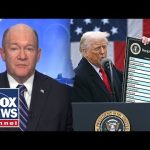Senator Markwayne Mullin of Oklahoma recently appeared on national television to defend President Trump’s trade policies, particularly the ongoing tariff measures aimed at addressing trade imbalances with countries like China. While critics have labeled these policies as a “trade war,” Mullin framed them as a necessary recalibration of the U.S. economy to protect American workers and industries. According to Mullin, these actions are long overdue after decades of harmful trade deals that have allowed foreign nations to exploit American markets at the expense of domestic manufacturing.
Mullin praised Trump’s bold approach to tariffs, arguing that they are not merely punitive measures but strategic tools designed to level the playing field. He acknowledged that tariffs may result in temporary price increases for consumers but emphasized the long-term benefits of reducing reliance on foreign supply chains and reinvigorating domestic production. Mullin dismissed concerns from some within his own party, such as Senator Rand Paul, who warned about political backlash. Instead, he commended Trump for taking a business-minded approach to economic policy, asserting that no previous administration has shown such resolve in defending American interests.
The senator also addressed the specific trade relationship with China, highlighting how the U.S. holds significant leverage due to its role as a major consumer of Chinese goods. Mullin argued that this dynamic provides an opportunity to negotiate better terms and push back against unfair practices like market restrictions and intellectual property theft. He stressed that America does not need to depend on China for critical goods and that fostering self-reliance in manufacturing aligns with both economic and national security priorities.
Turning to domestic fiscal policy, Mullin reassured viewers that ongoing budget discussions in Congress would not result in cuts to essential programs like Medicaid and Social Security. Instead, he framed these efforts as an attempt to eliminate waste and inefficiency while extending Trump-era tax cuts. Mullin defended these tax policies as a means of empowering Americans to keep more of their earnings, which he believes will spur economic growth and job creation. He argued that government overreach has historically stifled innovation and prosperity, making tax relief a cornerstone of economic revitalization.
In closing, Mullin expressed optimism about the future of the U.S. economy under Trump’s leadership. He emphasized the importance of collaboration between Congress and the White House in achieving fiscal responsibility and fair trade practices. For Mullin, Trump’s commitment to keeping promises made to the American people is evident in his willingness to take on difficult issues like trade imbalances and inefficient government spending. By prioritizing American workers and industries, Mullin believes this administration is laying the groundwork for sustained economic growth and national strength.




